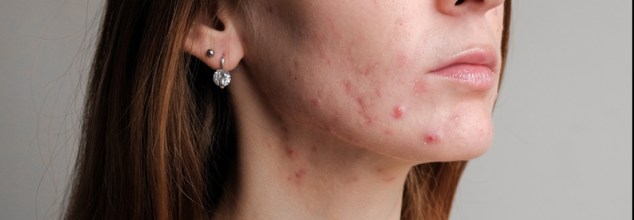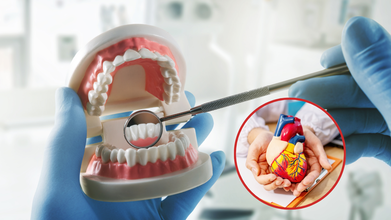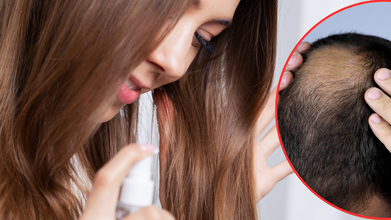- Health Conditions A-Z
- Health & Wellness
- Nutrition
- Fitness
- Health News
- Ayurveda
- Videos
- Medicine A-Z
- Parenting
- Web Stories
Winter Acne Triggers You Didn't Know About- Tips To Keep Your Skin Clear In The Cold

Winter Acne Triggers You Didn't Know About- Tips To Keep Your Skin Clear In The Cold
As winter sets in, I am ready to brace myself not only for the chill but for another unwelcome companion – acne. For those with oily or combination skin will understand, acne-prone skin, winter can be surprisingly challenging. The cold brings a dull, dry quality to the air that strips my skin of moisture, triggering it to produce more oil to compensate. This often leads to breakouts, an unwelcome sight in a season meant for festive gatherings and cozy moments.
While many believe acne is strictly a summer issue, winter weather has its own ways of aggravating our skin. Understanding these seasonal triggers can help those of us with sensitive, breakout-prone skin take proactive steps for clearer, healthier skin through the winter months.
Do You Know What Triggers Acne in Winter?
1. Hot Showers
While there’s nothing better than a hot shower on a chilly day, prolonged exposure to hot water can strip the skin of its natural oils. This disruption of the skin barrier leads to increased oil production and potential acne. Aim to keep showers lukewarm and brief to preserve your skin’s natural moisture.
2. Winter Clothes
Bundling up in scarves, hats, and turtlenecks is essential for staying warm, but it can also trap heat and sweat close to the skin. The friction from these layers can irritate sensitive skin and contribute to acne, especially along the jawline and neck. Stick to breathable fabrics like cotton and make sure to wash your winter gear regularly to prevent bacterial buildup.
3. Indoor Heaters and Heating
Most of us rely on heaters to stay warm, but these can create a dry indoor environment that pulls moisture from the skin. Similar to dry outdoor air, this can cause the skin to overproduce oil, which in turn can clog pores. Adding a humidifier to your home or office can help keep indoor air balanced and your skin hydrated.
4. Not Applying Sunscreen
In winter, many people skip sunscreen, assuming it's unnecessary on cloudy days. However, UV rays can still penetrate clouds and reflect off snow, exposing skin to harmful effects. Regularly applying a broad-spectrum sunscreen can help prevent UV damage and reduce the risk of post-inflammatory hyperpigmentation from acne.
5. Hydration
The cold can dull our sense of thirst, leading to reduced water intake. Proper hydration is essential for maintaining skin health and reducing acne, so make sure you’re drinking enough water each day to keep your skin moisturized from within.
Ways to Manage Winter Acne
Moisturize Wisely: Use a non-comedogenic moisturizer suited for winter dryness. Look for hydrating ingredients like hyaluronic acid or glycerin that won’t clog pores.
Limit Hot Showers: Opt for lukewarm showers to keep natural skin oils intact, and finish with a gentle, hydrating cleanser.
Stay Sun-Safe: Apply sunscreen daily, even in winter, to protect against UV rays and reduce acne scars.
Add Humidity Indoors: Invest in a humidifier to balance indoor dryness. It will help your skin retain moisture and reduce excess oil production.
Stay Hydrated: Don’t forget to drink water throughout the day. Proper hydration will support your skin’s resilience and help prevent acne.
Can Bad Oral Health Lead To Heart Attacks? Study Reveals Mouth-Cardiovascular Link

(Credit- Canva)
One of the first impressions we make is from a person’s oral hygiene. How clean their teeth look, if they have any mouth odor, how they eat etc. However, did you know, that your mouth health could also make your heart diseases worse? Could they be the actual reason behind what triggered your heart disease?
New research suggests that the health of your mouth might be connected to the health of your heart. A study found that the fatty clogs in our arteries, known as plaques, often contain bacteria. This hints that a slow, ongoing inflammation caused by these bacteria and our body's reaction to them could be a major factor in heart disease.
According to the American Heart Association, the germs from your mouth can affect your heart? The same bacteria that cause tooth decay and gum disease can travel to other parts of your body, including your heart, potentially leading to serious health problems.
What Is The Connection Between Bacteria and Clogged Arteries?
Plaques are a buildup of fatty stuff inside your arteries, and this is a long-term problem caused by inflammation. For a long time, doctors have wondered if infections play a role in this process. While early studies were promising, giving antibiotics to people with heart disease didn't seem to help much.
This new study proposes a different idea: maybe certain bacteria form a protective "biofilm" inside the plaques, where they sit quietly and cause a low-level inflammation. This biofilm might hide the bacteria from our immune system and make them resistant to antibiotics. Over time, this quiet infection could turn a stable plaque into a dangerous one that could rupture and cause a heart attack.
How Does Oral Bacteria Affect Heart Health?
A type of bacteria called viridans streptococci has been found in these plaques. These bacteria normally live in our mouths and are involved in forming dental plaque. They often get into the bloodstream during dental procedures. The study found that:
- Over half of the plaques from the people studied contained bacteria.
- The most common type of bacteria was the one from the mouth, found in about 42% of the samples.
- The presence of these mouth bacteria was directly linked to severe artery problems and death from heart disease.
The research showed that these bacteria weren't just passing through the arteries; they were setting up a little community—a biofilm—inside the plaques. This biofilm acted like a shield, protecting the bacteria from our immune system.
But when a plaque breaks open, which is what causes a heart attack, the bacteria inside the biofilm get out. This triggers a huge immune response that can weaken the plaque's outer layer, leading to a blood clot that blocks blood flow to the heart.
Is This a New Way To Fight Heart Diseases?
The study concludes that these mouth bacteria are not harmless. Instead, a hidden, long-term bacterial infection in the form of a dormant biofilm may be what turns a stable plaque into a dangerous one. This finding highlights how important inflammation is in heart disease and could lead to new ways to diagnose and prevent it in the future.
Could You Reverse Hair Loss And Regrow Bald Spots? New Chemical Agent Could Increase Hair Density by 20%

(Credit- Canva)
Hair is one of the key aspects of a person’s look. A simple haircut can completely change the way you look. So, you can imagine how losing one’s hair can affect them. While it happens to many people, it can completely change the way they view themselves. Although it is a normal part of aging, many men face this challenge from a young age due to many reasons like genetics, male-patterned baldness etc.
While there are ways you can tackle major hair loss like hair transplant, not everyone can afford it. However, a new drug called PP405 might be a game-changer for baldness. Instead of just slowing down hair loss, this new topical drug actually helps "wake up" your hair follicles that have gone to sleep. In early tests, it showed promising results, making hair thicker for some people who used it. If this treatment works in bigger trials, it could be a whole new way to fight baldness.
How the New Hair Growth Drug Works?
The new drug, PP405, is a topical cream that you apply to the scalp. It's different from older treatments because it doesn't just try to slow down hair loss. Instead, it works by waking up the hair follicles that have become dormant, or "asleep." Scientists found that in many people with hair loss, the stem cells in their hair follicles aren't dead—they've just stopped working. This new drug specifically targets these dormant cells to get them growing hair again.
In an early study, led by dermatologist Qing Yu Christina Weng, MD, chief medical officer of Pelage Pharmaceuticals, the results were very promising: some patients saw their hair become more than 20% thicker. The new hair wasn't just thin, "baby hair"; it was thick, mature hair. A key safety feature is that the drug is designed to get into the skin where it's needed without being absorbed into the rest of the body.
Can You Regrow Hair With Medicine?
Dermatologists are excited about the new drug's potential because it offers a completely new way to treat hair loss. However, they are also being cautious. The study so far was small and short, and the results haven't been fully checked by other scientists yet. The drug still needs to go through much larger studies, which could take a few years.
Right now, the only FDA-approved treatments for hair loss are finasteride and a topical solution called minoxidil. While doctors sometimes use an oral version of minoxidil, these treatments don't work for everyone, especially for those with severe hair loss. This leaves many people with limited options, often turning to expensive and unproven treatments like special injections or lasers.
Does The New Hair Growth Drug Work?
If PP405 passes its larger trials, it could be a huge breakthrough. It would be the first new FDA-approved hair loss treatment in over 25 years. This could be especially helpful for people who have more severe hair loss and haven't had success with other medications.
The researchers also believe this drug might one day be used to treat other types of hair loss, such as hair thinning caused by certain medications or hormonal changes. However, experts say that before the drug is used for other conditions, it must be thoroughly tested in larger groups of people to prove it is safe and effective.
Dermatologist Reveals Why Using The Same Skincare Day And Night Could Be Ruining Your Skin

Credits: Health and me
Your skincare shelf might be quietly sabotaging your glow—and you don’t even know it. Think about it: the same cream you swipe on at 7 a.m. is also applied at 11 p.m. But your skin isn’t static; it’s a living, breathing organ with different priorities depending on the time of day. Morning skin is on defense, battling sunlight, pollution, and blue light, while nighttime skin is in repair mode, regenerating and replenishing. Using the same products both times may be convenient, but convenience could come at the cost of healthier, radiant skin.
Skincare seems simple on the surface—wash, moisturize, repeat. Many of us follow the same routine morning and night, believing that if a product works once, it works all day. But according to dermatologist Dr. Vikram Lahoria, this approach may be doing more harm than good. Your skin operates on a circadian rhythm, and the way it behaves during the day differs significantly from its nighttime activities. Understanding these differences—and adjusting your routine accordingly can be the difference between healthy, glowing skin and clogged pores, premature aging, or irritation.
How Your Morning Skincare Is A Shield?
Dr. Lahoria explains, “During the day, your skin is exposed to sunlight, pollution, dust, and even the blue light from screens. Its main role is protection. That’s why your morning routine should focus on creating a barrier against these environmental stressors.”
A typical morning routine starts with a gentle cleanser to remove oils and sweat accumulated overnight. This is followed by a light, hydrating moisturizer that won’t feel greasy or clog pores. The most crucial step in your AM routine is sunscreen. No matter the weather, SPF shields your skin from UV rays, reducing the risk of premature aging, pigmentation, and even skin cancer.
Adding an antioxidant serum, particularly one with vitamin C, can further protect against free radicals generated by pollution and UV exposure. “Think of it as giving your skin armor before stepping into the world,” says Dr. Lahoria.
How Your Night Skincare Is To Heal and Recharge?
Once the sun sets and the day winds down, your skin switches gears. “Nighttime is when your skin works hardest to repair itself,” Dr. Lahoria notes. Without sunlight and environmental stressors, skin cells can focus on regeneration and replenishment.
Night creams and serums are designed to support this process. Ingredients like retinol, peptides, hyaluronic acid, and glycolic acid target fine lines, improve texture, and lock in moisture. A thorough cleanse is essential before applying these products to remove makeup, sweat, and dirt that could block pores overnight.
“Nighttime is when your skin absorbs products most efficiently. The lack of UV exposure means potent actives like retinol can work without the risk of sun-induced irritation,” explains Dr. Lahoria.
Why Using the Same Products All Day Can Backfire?
Using identical products morning and night ignores the skin’s shifting priorities. “It’s like feeding your body the same meal for breakfast and dinner,” says Dr. Lahoria. “In the morning, your skin needs protection. At night, it needs repair. One product cannot optimally serve both functions.”
Daytime exposure to retinoids or AHAs, for instance, can increase sensitivity to sunlight, potentially causing irritation, pigmentation, or damage. Conversely, using sunscreen at night is unnecessary, and while it won’t harm your skin, it doesn’t contribute to repair either. Tailoring your routine ensures that ingredients work when they are most effective, rather than canceling each other out or creating unintended side effects.
Why The Order of Products Is Important?
Timing is not the only consideration—the order in which you apply your skincare products matters too. Dr. Lahoria advises layering from thinnest to thickest. This ensures lightweight serums penetrate deeply before being sealed in by heavier creams or oils. Incorrect layering can hinder absorption or even reduce the efficacy of active ingredients.
For example, a vitamin C serum should be applied before moisturizer, while a heavier night cream should go last. By following this approach, each product can work as intended, maximizing benefits without waste or interference.
Personalising Your Routine to Your Skin’s Clock
Your skin, like your body, has a circadian rhythm. During the day, its priority is defense; at night, it focuses on repair. “Ever wonder why your skin behaves differently in the morning than it does at night? That’s your internal clock at work,” Dr. Lahoria points out.
Adjusting your routine according to this natural rhythm ensures your skin gets the right nutrients at the right time. In the morning, protect; at night, repair. Over time, this approach improves skin health, prevents premature aging, and enhances the results from the products you invest in.
Morning and Night Routine Tips
Dr. Lahoria summarizes an effective framework:
Morning:
- Gentle cleanser to remove overnight oils
- Light moisturizer for hydration
- SPF to protect against UV damage
- Optional antioxidant serum for pollution defense
Night:
- Thorough cleanse to remove dirt, makeup, and pollutants
- Serums or creams containing retinol, peptides, hyaluronic acid, or glycolic acid
- Night cream to lock in moisture and support cell repair
Following these guidelines ensures that your skin is supported according to its natural needs, rather than treated with a one-size-fits-all approach.
Skincare is not just about selecting the “right” products—it’s also about using them at the right time. Dr. Lahoria concludes, “Your morning and evening routines should act like a tag team. Each plays its role in protecting, repairing, and energizing your skin. Your clock isn’t just ticking, it’s guiding your glow.”
By understanding your skin’s natural cycles, choosing the right ingredients for day and night, and applying them in the correct order, you ensure your skin remains healthy, radiant, and resilient—without unnecessary irritation or damage.
Dr. Vikram Lahoria is a consultant dermatologist and medical advisor at Ceuticoz in India
© 2024 Bennett, Coleman & Company Limited

